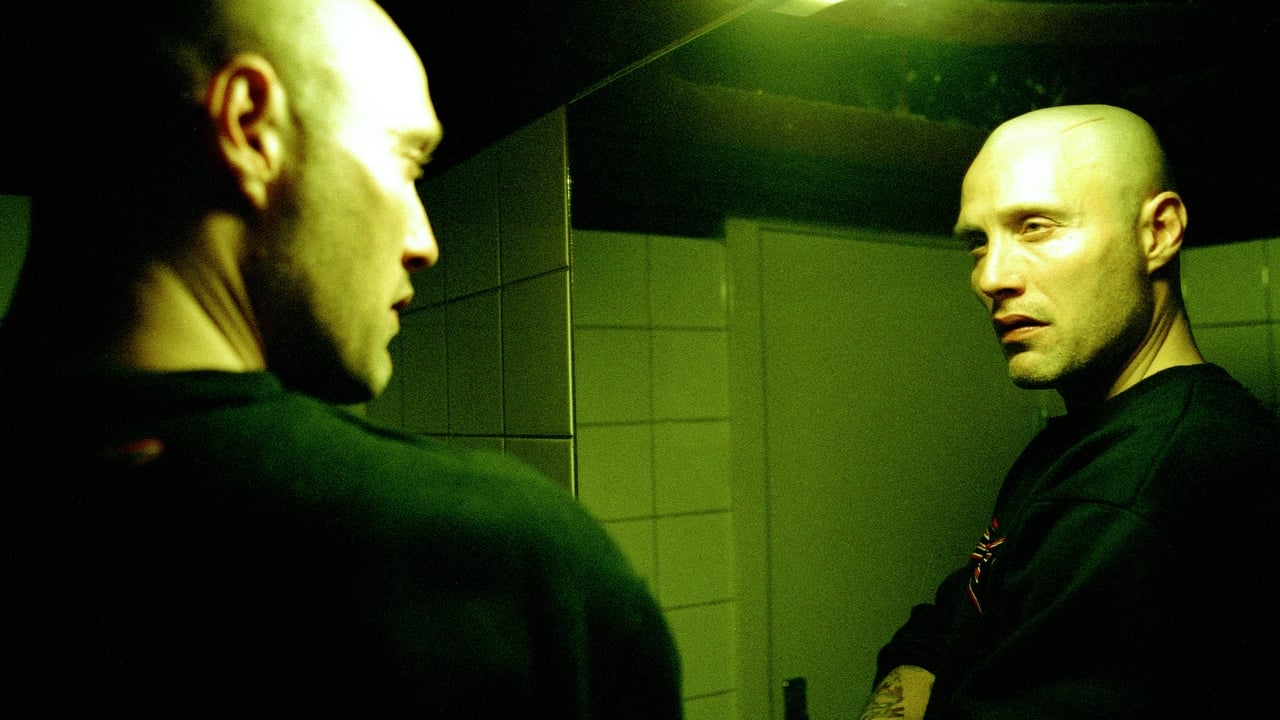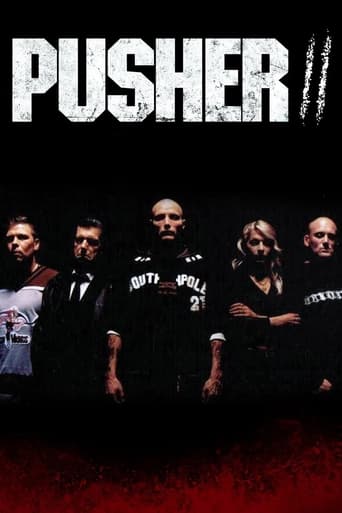

"Pusher II" is, in almost every way, an improvement upon the first "Pusher" film. Whereas the first film focused on how the criminal activity of the main character affected his relationships and, subsequently himself, and in doing assumed a very physical and corrosive quality to its narrative, "Pusher II" aims for something more intricate. Instead of focusing on how the professional life of the main character digs into his personal life, the film intertwines both the professional and the personal to the point where they cannot be considered exclusively of one another. This is done with the same style of intelligent and subtle writing displayed in the former film; the main character is Tonny - who was the best friend of Frank, the main character from the first film - and, upon leaving prison, he enters into a criminal automobile business with his father, who also serves as his criminal authority throughout the film. This unstable and often passively hostile relationship serves as the fulcrum of the film's narrative, and from here fork two sub-narratives, each of which pertains to either the professional or the personal aspect of Tonny's life. The personal is a woman he once slept with and mistakenly impregnated. She is seeking what he owes her as the absent father of their son - however, she hates him, and considers him scum of the lowest order. The professional is a friend - or perhaps merely an acquaintance - who slyly ropes Tonny into an attempt on his part to execute a deal, and to settle the resulting debt after that deal blows up in his face. Each of these subplots serve as crucial indications of the narrative's intricate welding of the main character's lives - the personal presents a gradual character development for Tonny, who comes closer to accepting his role as a father as the film progresses, even if it is in an attempt to impress his despondent father. The professional, on the other hand, accentuates the less focal role that the criminal elements of the film play within the narrative. Whereas, in the previous film, the main character spent his time attempting to appease a debt that he was directly responsible for, in "Pusher II" Tonny becomes involved with a man who is attempting the same thing. It can be said that, off-screen, this individual is undergoing a very similar narrative to Frank's from the first "Pusher," yet Tonny's more reclined involvement in it is what we experience within this film. The characters are just as strong and realistic as the first film, thanks to the same characteristically subtle and intelligent writing, combined with nuanced and masterfully refrained performances - particularly from Mikkelsen. There is also greater emphasis on the regard in which supporting characters regard Tonny, in contrast to the first "Pusher," where most characters afforded Frank a relatively equal degree of reverence. The film also serves as a worthwhile sequel - casually referencing aspects of the first film without dwelling on them for the sake of forced interconnectedness. In all, "Pusher II" presents an improved narrative than its predecessor - whereas the former film presented a man and his personal life being eroded by the stress of his professional life, this film presents a man attempting to balance the two, and subsequently commencing a gradual and arduous climb to becoming something more than what he starts out as. The visual elements of "Pusher II" also present a drastic improvement on its predecessor. Whereas the first "Pusher" possessed a rough and raw visual style that suited its narrative very well, "Pusher II" retains this style while managing to improve on certain areas. The camera work is more graceful, without robbing the film of its DIY aesthetic; and the framing of shots is improved, displaying greater composure and aesthetic craftsmanship. The direction also manages to flesh out more intricate features of the writing, often through close-ups and slow push-ins to define states of anxiety or certain mental realisations. Also, the lighting is drastically improved, and hence there are no longer scenes of complete darkness, while all the while maintaining the impression of having been shot exclusively in natural lighting. The film is also able to implement style without interjecting the gritty quality, often through the selective use of music - whereas the first film consisted almost exclusively of rough and ready Punk instrumentals that would often explode into the screen, "Pusher II" contains pieces that steadily build up, hence heightening suspense within key scenes, as well as ambient pieces that are able to add an ethereal mood to scenes of latent and powerful emotion. Certain scenes of subdued tension also sound as though they contain extremely quite harmonies - simmering just beneath surface level. Overall, both the written, acted and visual aspects of "Pusher II" all work harmoniously to bring about a work that is in equal parts rough and realistic as is stylish and at times cerebral. The film maintains the characteristic intelligence and subtlety of the film preceding it, while exploring new narrative structures and presenting greater degrees of intricacy and artistic ability.
... View MoreAfter watching Pusher, there aren't many things left to be said. Or are there?Pusher II follows Tony (Mads Mikkelsen) after his release from prison. He tries to get a grip on reality, however, the old ways have their appeal and he slips back into his old lifestyle. It is left open whether Tony is simply confused or whether he has some permanent brain damage after being beaten by Frank (Kim Bodnia) in the first part. In any case, he proceeds with his ridiculous "Respect" tattoo on the back of his head.Tony discovers he has a child. The gangster lifestyle is depicted again with out any glamor leaving Tony to think about more than his own future.
... View MoreIn the second part of the Pusher saga Nicolas Winding Refn zooms in on Tonny, Frank's buddy from the first film. In the last film Frank choose to beat his friend half to death with a baseball bat. Tonny survived with scars and what seems to be brain damage. Tonny has just come out of jail and struggles with debts, a child he unwillingly fathered with a prostitute and earning the love and respect of his father, the ruthless gangster kingpin known as Smeden. If the first film made Tonny look ridiculous, this makes him right out tragic. Tonny is not a truly bad person, he just douse not know better. He's a kid raised by a prostitute mother and neglected by his gangster father. On his back head he has tattooed the word: RESPECT, but through out the movie he is spit on by everybody except his very sympathetic criminal friend Ø and Milo, the drug-lord from the first film. Smeden has a younger son, Valdemar, with another prostitute and wants to raise the child for himself while the prostitute wants to keep her son.In this film, Refn once again shows the audience the hell of the criminal world. These are people who behave tough on the outside but are nothing more than psychopaths or uneducated people trying to make a living. There is nothing cool about this way of life. Tonny visits the brothels instead of trying a relationship, this habit is shown to be a indirect influence of his father who douse the same. His drug use has rendered him impotent. Tonny manages to make a fool out of himself time after another, is tricked by the loathsome pimp Kusse-Kurt(Kurt the C**t) and is denied any kind of credit by Smeden when he does well in a car-robbery. When his father finally gives him the chance to obtain his love Tonny had to commit a crime far worse than anything he's ever done Tonny instead make the right choice. It's the most positive ending of any of the Pusher films. Tonny does the right thing and redeems himself. The movie ends with the image of Tonny's tattoo, which is the one feeling I feel for him at that moment: RESPECT.Mads Mikkelsen is great as Tonny and puts in all the humanity the part needs. Leif Sylvester gives a performance with many layers and sides. Kurt Nielsen is disgusting as the wicked and cowardly pimp and Zlatko Buric steals his one scene. The original music by Peter Peter and his Bleeder Group creeps under the skin.There is a fantastic lighting in the film with rich colors. On the other hand, the film lacks the nerve of Pusher and Pusher 3. It does not have the same energy and loses on it. But it's far from a bad film. A must see for anyone. And don't forget to see the other parts.
... View MoreSeen this clichéd piece of film-making tonight; now I want my money back; extremely disappointing film on all levels.After enjoying the freshness of the original Pusher, then Bleeder was alright film overall; although it was hailed as a big advertising flop here in Denmark.Anyway, this Pusher 2, of which I hear the only reason they made this, is that they thought they could big money on a sequel and they needed it because their production company's Fear X was a big flop in America. Personally I think this is always a bad idea to make a movie from this viewpoint.The "story" follows Tonny (not a bad performance by Mads Mikkelsen but nothing at all special either) as he comes out of prison and finds out about his family and stuff and oh yeah steals a Ferrari; which turns out to be the biggest laugh of the film; somebody leaves a Ferrari in the middle of the road with the keys in it, hops out to say hi to his girlfriend and Tonny steals it...ha ha..yeah lucky guy!!! I love dark and gritty films but please don't give me this clichéd nonsense...and by the way; if all these guys and girls have no money, how is it that every scene you see them, they are snorted coke? It just made it all seem less real and the filmmaker was trying too hard to be "ghetto"...it just doesn't work.I heard there is another Pusher 3 in on the way, lets hope they bring back Kim Bodnia !!YEAH!! and all will be forgiven for this mess!
... View More